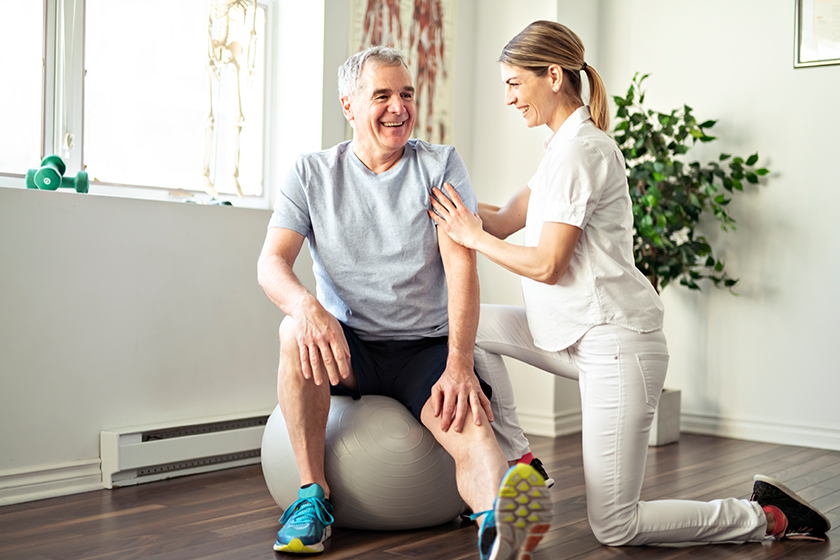Experiencing an injury can bring challenges, especially for older adults. Injuries can affect your ability to move, engage in daily activities, and enjoy the things you love. However, successful recovery is achievable with the right support and guidance. Here, we’ll explore steps to support seniors’ recovery after an injury so that you can feel confident and encouraged on your path to regaining strength and independence.
The Importance Of Asking For Help
One of the first things to remember after an injury is that you do not have to go through recovery alone. Seeking help from friends, family, and our caring team can make a big difference in your healing. Having others help with tasks like cooking, cleaning, and errands gives you the time to rest and focus on getting better. Some residents may feel hesitant to ask for help, but it’s important to recognize that support is available and that you’re not burdening anyone. If performing daily tasks becomes challenging, staying in a supportive environment, like our retirement community, may offer the temporary assistance you need to make recovery smoother and safer.
The RICE Method For Minor Injuries
If you’ve experienced a mild injury, such as a sprain, the RICE method; rest, ice, compression, and elevation, can be beneficial. Health professionals often recommend rest for at least 24 hours to prevent further strain on the injured area. Applying ice can help reduce swelling, and using an elastic bandage can provide gentle compression, which can limit inflammation. Elevating the injured area also encourages fluids to move away from the site, helping reduce any swelling. Simple methods like these can make a difference in early recovery by keeping swelling and discomfort to a minimum.
Safe Use Of Pain Relievers
Pain relievers can bring comfort, but it’s essential to use them safely. Different medications may interact with health conditions or affect your body differently. For example, medications like ibuprofen may not be suitable for individuals with heart or stomach conditions. Always talk to your healthcare provider before starting any new medication to ensure it’s safe for your needs. When using over-the-counter pain relievers, follow the dosage instructions carefully, and let your provider know if you experience any side effects or concerns. Your safety is a priority, and proper pain management can support a smoother recovery.
The Benefits Of Physical Therapy
Physical therapy can provide significant support in regaining mobility and strength after an injury. Licensed physical therapists guide you through exercises designed to build up muscles and improve movement in affected areas. If your healthcare provider recommends physical therapy, consider it a valuable part of recovery. A therapist will work with you at a comfortable pace, ensuring that exercises are safe and effective. Physical therapy can often help reduce the need for pain medication by strengthening the body and increasing flexibility, helping you return to everyday activities sooner.
Taking Care Of Mental Health
An injury can affect both your physical well-being and your emotional state. You may experience sadness, frustration, or worry, especially if you are unable to enjoy your favorite activities during recovery. Focusing on mental health during this time helps reduce feelings of isolation and anxiety. Connecting with friends, family, or a mental health professional can bring comfort and reassurance. Writing in a journal is another effective way to express your thoughts and monitor your progress as you heal. Activities like reading, pursuing hobbies, or spending time with others in small gatherings can also lift your mood and provide a sense of purpose, helping you maintain a positive outlook throughout your recovery.
Being Patient With The Healing Process
Recovery can sometimes feel slow, but it’s important to allow yourself the time needed for a full recovery. The healing process may naturally take longer as we age, so staying patient is essential. Rushing back to activities too soon can increase the risk of re-injury, which may make recovery even more challenging. Celebrate small improvements each day, whether it’s a reduction in pain, increased mobility, or just feeling stronger. Taking things one step at a time can help maintain a positive mindset and give your body the chance to heal effectively.
Successful Recovery And A Path To Greater Well-Being
Recovering from an injury can be a journey that requires patience, support, and the right care. Our retirement community is here to support each resident’s journey to wellness by offering a caring environment where recovery and well-being come first. Through safe, effective recovery practices and a focus on health and happiness, we strive to provide a positive experience that leads to renewed strength and confidence. We believe that everyone can achieve successful recovery with the right guidance, care, and encouragement.
If you have any questions about our senior assisted living services and memory care services, get in touch with us today.







